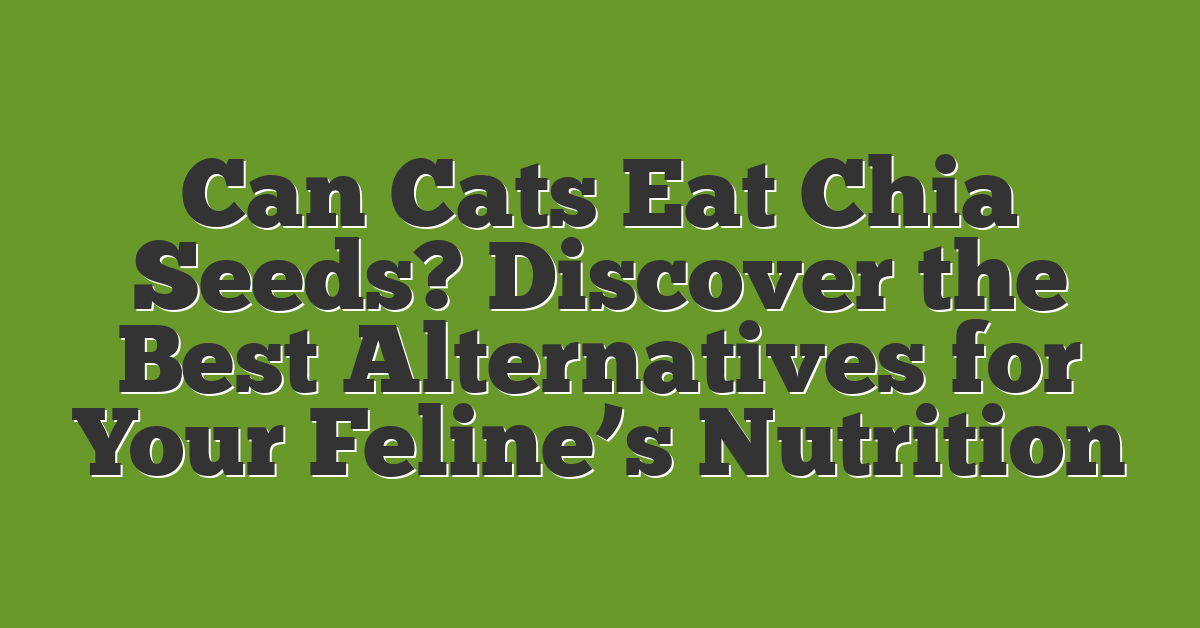What are chia seeds?
Chia seeds are tiny black seeds that come from the plant Salvia hispanica, which is native to Central and South America. They have been used as a food source for centuries and are gaining popularity as a superfood. Chia seeds are rich in nutrients such as fiber, protein, and omega-3 fatty acids. They also contain essential minerals like calcium, phosphorus, and magnesium.
- Chia seeds are known for their ability to absorb liquid and form a gel-like consistency, making them a popular addition to puddings and smoothies.
- They have a mild, nutty flavor that pairs well with a variety of foods.
- Chia seeds are a good source of antioxidants that may help protect against chronic diseases.
- They are gluten-free, making them suitable for individuals with gluten sensitivities or celiac disease.
- Chia seeds are often considered a good source of hydration due to their ability to hold water.
While chia seeds offer many nutritional benefits for humans, it’s important to consider if they are safe for our feline friends. As a responsible cat owner, you want to ensure that your furry companion stays healthy and receives a balanced diet. Let’s explore whether or not cats can eat chia seeds and if they provide any benefits for our feline friends.
Nutritional benefits of chia seeds for humans
Chia seeds have gained popularity for their numerous health benefits. So, what makes them so special for us humans? Let’s take a closer look at the nutritional benefits of chia seeds:
1. High in Fiber: Chia seeds are an excellent source of dietary fiber, which is important for maintaining a healthy digestive system. Fiber helps regulate bowel movements and can aid in preventing constipation.
2. Omega-3 Fatty Acids: These tiny seeds are one of the richest plant-based sources of omega-3 fatty acids, which are essential for brain function and heart health. Omega-3s also have anti-inflammatory properties, potentially reducing the risk of chronic diseases.
3. Protein Powerhouse: Chia seeds are a great plant-based protein option. They provide all nine essential amino acids, making them a complete protein source. Protein is necessary for muscle growth, repair, and overall body functioning.
4. Loaded with Antioxidants: Chia seeds are packed with antioxidants that help fight free radicals in the body. Antioxidants can help reduce the risk of chronic diseases and slow down the aging process.
5. Rich in Essential Minerals: Chia seeds are a good source of essential minerals such as calcium, magnesium, and phosphorus. These minerals are important for maintaining strong bones and teeth, as well as supporting overall cellular function.
6. Gluten-Free and Low in Carbohydrates: If you’re following a gluten-free or low-carb diet, chia seeds are a great addition to your pantry. They are naturally gluten-free and low in carbohydrates, making them suitable for a variety of dietary needs.
While chia seeds offer many nutritional benefits to humans, it’s important to note that cats have different dietary requirements. As a responsible cat owner, you should always consult with your veterinarian before introducing any new foods into your cat’s diet.
So, while chia seeds may be a nutritious addition to your own meals, it’s best to keep them out of your cat’s food bowl. Ensuring that your feline friend receives a balanced and complete diet specifically formulated for their needs is essential for their overall health and well-being.
Remember, always prioritize the well-being of your feline companion and provide them with the appropriate food that meets their specific nutritional needs.
Can cats eat chia seeds?
As a cat lover, you always want to provide the best for your furry friend. You may have heard about the nutritional benefits of chia seeds for humans and wondered if they are safe for cats too. Well, the answer is a bit complicated.
While chia seeds are packed with nutrients like fiber, omega-3 fatty acids, protein, antioxidants, and essential minerals, they are not an essential part of a cat’s diet. Cats have different dietary requirements compared to humans, and it’s important to prioritize their specific needs.
Here’s what you need to know about chia seeds and cats:
- Digestibility: Cats have a shorter digestive system than humans, making it challenging for them to break down plant-based foods like chia seeds. This can lead to digestive upset, including diarrhea and vomiting.
- Essential Nutrients: Cats are obligate carnivores, meaning they require specific nutrients found in meat to thrive. While chia seeds offer some nutritional value, they cannot replace the essential nutrients obtained from a balanced, high-quality cat food.
- Potential Risks: Chia seeds can swell in a cat’s stomach, causing discomfort and potentially leading to an intestinal blockage. Additionally, some chia seeds may contain additives or pesticides that could be harmful to your feline friend.
- Consult Your Veterinarian: Before introducing any new food into your cat’s diet, it’s crucial to consult with your veterinarian. They can provide personalized advice based on your cat’s health, age, and individual needs.
While chia seeds may be healthy for humans, they are not recommended for cats. It’s best to stick to a complete and balanced cat food that meets all their nutritional requirements. Remember, your veterinarian is the best source of information when it comes to your cat’s diet.
Potential risks of feeding chia seeds to cats
As a cat lover, you may be wondering if it’s safe to feed chia seeds to your feline friend. While chia seeds offer numerous health benefits for humans, it’s important to understand that cats have different dietary requirements. Before introducing any new food into your cat’s diet, it’s crucial to consider the potential risks involved.
Here are some potential risks to keep in mind when it comes to feeding chia seeds to cats:
- Gastrointestinal Upset: Cats have sensitive digestive systems, and introducing unfamiliar foods can cause gastrointestinal issues such as diarrhea, vomiting, or constipation. Chia seeds, when consumed in large quantities, may lead to an upset stomach in cats.
- Choking Hazard: Chia seeds, when eaten dry, can absorb liquid and expand in the throat or digestive tract. This could pose a choking hazard for your cat. It’s essential to ensure that chia seeds are soaked or ground before feeding them to your furry friend.
- Allergies or Sensitivities: Cats can develop allergies or sensitivities to new foods. While allergies to chia seeds are rare in cats, it’s still possible. If you notice any signs of an allergic reaction, such as itching, sneezing, or swelling, discontinue feeding chia seeds and consult your veterinarian.
- Imbalanced Nutrition: Cats require a specific balance of nutrients to maintain their health. While chia seeds do offer some nutritional benefits, they should not be a substitute for a complete and balanced cat food. Feeding chia seeds in excess may lead to imbalanced nutrition and deficiencies in essential nutrients that cats need to thrive.
Remember, as a cat lover and expert, your top priority is the well-being of your furry companion. Always consult with your veterinarian before introducing any new food into your cat’s diet. They can provide personalized guidance based on your cat’s specific nutritional needs and help you make informed decisions about their diet.
By being cautious and informed about the potential risks, you can ensure that your cat stays healthy and happy. So, when it comes to chia seeds and cats, it’s best to prioritize their overall health and rely on a complete and balanced cat food to meet their nutritional needs.
Alternatives to chia seeds for cats
When it comes to providing your feline friend with a well-balanced diet, it’s important to consider all aspects of their nutrition. While chia seeds might sound like a healthy option, there are alternative choices that are better suited for your cat’s specific nutritional needs. Here are a few alternatives to chia seeds that you can confidently incorporate into your cat’s diet:
1. Canned Fish
Cats are obligate carnivores, which means their bodies require a source of animal protein to thrive. Canned fish, such as tuna or salmon, can be a tasty and nutritious alternative to chia seeds. Make sure to choose canned fish that is packed in water rather than oil, and avoid any added salt or seasonings.
2. Cooked Meat
Cooked lean meats, like chicken or turkey, are another excellent alternative to chia seeds. These protein-rich options provide essential amino acids that cats need for optimal health. Remember to remove any bones and skin before feeding cooked meat to your furry friend.
3. High-Quality Commercial Cat Food
If you’re looking for a convenient and complete option, high-quality commercial cat food is the way to go. Look for brands that meet the Association of American Feed Control Officials (AAFCO) standards, as this ensures that the food contains essential nutrients for your cat’s well-being.
4. Bone Broth
Bone broth can be a great supplement to your cat’s diet, offering hydration and added nutrients. It’s important to make sure the broth is made from high-quality ingredients and does not contain any added seasonings or ingredients that could be harmful to your cat.
Remember, it’s always best to consult with your veterinarian before making any significant changes to your cat’s diet. They can provide advice tailored to your cat’s unique needs and help you make informed decisions about their nutrition.
By providing your cat with appropriate alternatives to chia seeds, you can ensure that they receive a balanced and healthy diet, supporting their overall well-being. So, go ahead and explore these alternative options to give your feline friend the nutrition they deserve.
Conclusion
When it comes to feeding chia seeds to your cat, it’s important to consider all aspects of their nutrition. While chia seeds may offer some health benefits for humans, they may not be suitable for cats.
In this article, we explored alternative choices that can provide your cat with the necessary nutrients. Canned fish, cooked meat, high-quality commercial cat food, and bone broth are all excellent options to consider.
Remember, it’s always a good idea to consult with your veterinarian before making any significant changes to your cat’s diet. They can provide personalized guidance based on your cat’s specific needs and health conditions.
Ultimately, providing a balanced and healthy diet is crucial for your cat’s overall well-being. By making informed choices and prioritizing their nutritional needs, you can ensure that your feline friend stays happy and healthy for years to come.
Frequently Asked Questions
Q: Can cats eat chia seeds?
A: No, cats should not eat chia seeds. While chia seeds offer health benefits for humans, they are not essential for cats and could cause digestive issues or blockages. It is best to avoid feeding chia seeds to cats.
Q: What can I feed my cat instead of chia seeds?
A: There are several alternatives to chia seeds that are safe and nutritious for cats. You can feed them canned fish, cooked meat (without seasonings or bones), high-quality commercial cat food, or bone broth.
Q: Should I consult with a veterinarian before changing my cat’s diet?
A: Yes, it is recommended to consult with a veterinarian before making any significant changes to your cat’s diet. They can provide personalized advice and ensure that your cat’s nutritional needs are met.
Q: Why is a balanced and healthy diet important for cats?
A: A balanced and healthy diet is crucial for a cat’s overall well-being. It supports their immune system, maintains a healthy weight, promotes good digestion, and can help prevent various health issues. Providing a balanced diet enhances the quality and longevity of a cat’s life.

















